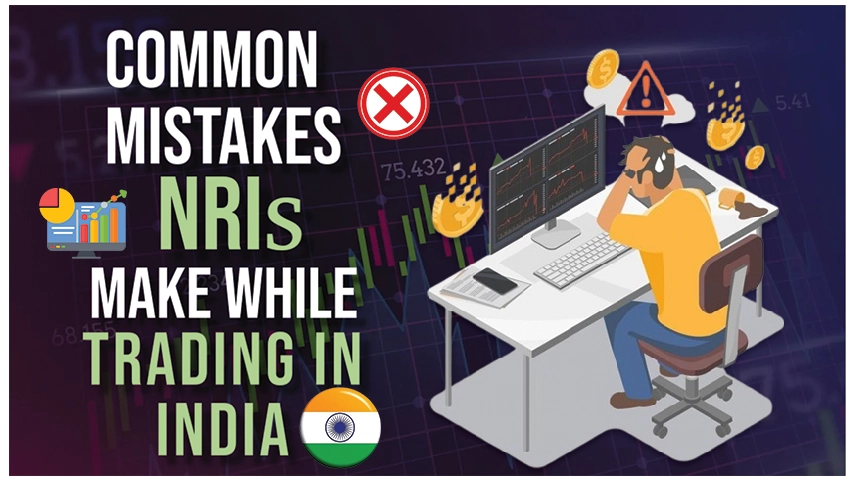Common Mistakes NRIs Make While Trading in India
Trade in the Indian stock market is an attractive alternative for many non-residents (NRIs) who want to invest in their country. However, navigation of Indian market rules, taxation and account layouts can be difficult from abroad. Many NRIS make unintentional mistakes while trading that can cause problems with compliance, loss or lack of opportunities. Here are some common errors that NRI should avoid doing business in India:

1. Using a Resident Trading Account
One of the most common errors continues to use a resident
trade and demat account after becoming NRI. In accordance with the RBI and SEBI
guidelines, NRI requires NRE/NRO-connected PIs (Portfolio Investment Scheme) to
open NRI-specific accounts for trade.
2. Ignoring PIS Regulations
There are specific rules in trade in the Indian stock market
during the PIS route. NRI often forgets to inform the bank to activate its bank
in its account or misunderstand what kind of transactions are allowed under PIs
(eg, only delivery-based stock trading mistakes is allowed, not intraday). Many
NRI mistakes in stock trading arise from using resident accounts instead
of NRI-compliant accounts, leading to regulatory issues.
3. Intraday Trading & Derivatives Without Permission
NRI is not allowed to do intraday trade in the stock segment
and should follow F&O trade restrictions, which require custody accounts
and special approval. Many NRIS accidentally violates these rules, causing
punishment or account pension.
4. Incorrect Tax Filing or Double Taxation
Indian income from the business is taxable. Many NRIs fail
to register taxes in India or do not declare this income in their home, which
causes double taxation or penalty reports. It is necessary to understand DTAA
(double -tax family agreement) and seek professional help when needed.
5. Choosing the Wrong Type of Account (NRE vs NRO)
A NRE account is a refund (money can be taken abroad), while
NRO is non-not-perfect (limited transfer allowed). NRIs often choose the wrong
type for trade, which affects the fund's Mobility and tax liability.
6. Not Updating KYC & Residency Status
Failure to update KYC with NRI position, new addresses and
foreign contact numbers can be a freezing in accounts. All changes should be
informed with the correct documentation to the bank and broker.
7. Neglecting Currency Conversion Costs
NRIS trade from the NRE account often ignores the exchange
rate fee and the conversion fee, which can eat in profits. Strategic currency
programs are required to manage costs.
8. Lack of Monitoring & Poor Research
Due to lack of differences in the time sector or access to
information, a link from the Indian market can lead to poor investment
decisions. Many NRIs depend on old data or rejected tips.
9. Overlooking Repatriation Rules
There is limited repetition (up to $ 1 million per year) in
profits earned through a NRO account. If returning is a goal, NRI should act
through an NRE-PIS account.
10. Ignoring Brokerage & Account Charges
The NRI trade accounts are often accompanied by high brokerage fees, annual maintenance fees (AMC) and currency fee. Always compare claims before choosing a broker.
Conclusion
Trade in India can be rewarded, but only if done
correctly. Understanding rules, choosing the right accounts, staying in line
with the RBI and SEBI regulations, and consulting financial advisors can
protect NRIs from expensive errors.
Read Also
What are the best NRI Investment Options in IndiaCan Nri Invest in Mutual Funds

0 comments